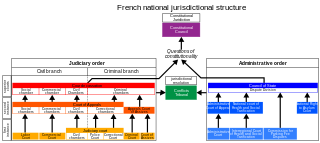Related Research Articles
Administrative law is a division of law governing the activities of executive branch agencies of government. Administrative law includes executive branch rulemaking, adjudication, and the enforcement of laws. Administrative law is considered a branch of public law.
Commercial law – body of law that governs business and commercial transactions. It is often considered to be a branch of civil law and deals with issues of both private law and public law. It is also called business law.

Otto Friedrich von Gierke, born Otto Friedrich Gierke was a German legal scholar and historian. He is considered today as one of the most influential and important legal scholars of the 19th and 20th century. In his four-volume magnum opus entitled Das deutsche Genossenschaftsrecht, he pioneered the study of social groups and the importance of associations in German life, which stood between the divide of private and public law.
Eugen Ehrlich was an Austrian legal scholar and sociologist of law. He is widely regarded as one of the primary founders of the modern field of sociology of law.

Rechtsstaat is a doctrine in continental European legal thinking, originating in German jurisprudence. It can be translated into English as "rule of law", alternatively "legal state", state of law, "state of justice", or "state based on justice and integrity". It means that everyone is subjected to the law, especially governments.

French law has a dual jurisdictional system comprising private law, also known as judicial law, and public law.
Astesanus of Asti was an important Franciscan canon lawyer and theologian, from Asti in Piedmont. His major work is Summa de casibus conscientiae, a confessional work, in manuscript from around 1317 and comprising eight volumes and three indices. Its writing is said to have been at the prompting of Cardinal Giovanni Gaetano Orsini.

The sociology of law, legal sociology, or law and society, is often described as a sub-discipline of sociology or an interdisciplinary approach within legal studies. Some see sociology of law as belonging "necessarily" to the field of sociology, but others tend to consider it a field of research caught up between the disciplines of law and sociology. Still others regard it as neither a subdiscipline of sociology nor a branch of legal studies but as a field of research on its own right within the broader social science tradition. Accordingly, it may be described without reference to mainstream sociology as "the systematic, theoretically grounded, empirical study of law as a set of social practices or as an aspect or field of social experience". It has been seen as treating law and justice as fundamental institutions of the basic structure of society mediating "between political and economic interests, between culture and the normative order of society, establishing and maintaining interdependence, and constituting themselves as sources of consensus, coercion and social control".

Sir Otto Kahn-Freund, QC was a scholar of labour law and comparative law. He was a professor at the London School of Economics and the University of Oxford.

Hugo Sinzheimer was a German legal scholar and contributed to the writing of the Weimar Constitution. He was a leading proponent of the concept of social law.
Gaston Jèze was a French academic, humanitarian and human rights activist. He was a professor of public law and the resident of the International Law Institute.
Paul-Louis Huvelin (1873–1924), generally known as Paul Huvelin, was a French legal historian.

Léon Duguit (1859–1928) was a leading French scholar of public law. After a stint at Caen from 1882 to 1886, he was appointed to a chair of constitutional law at the University of Bordeaux in 1892, where one of his colleagues was Émile Durkheim.
Carl Baudenbacher is a Swiss jurist. He has served as a judge of the EFTA Court from September 1995 to April 2018 and was the court's president from 2003 to 2017. He was a full professor at the University of St. Gallen from 1987 to 2013 and a permanent visiting professor at the University of Texas at Austin School of Law from 1993 to 2004.
Hans Carl Nipperdey was a German labour law expert who worked as the president of the Federal Labour Court from 1954 to 1963. He was a controversial figure due to his close association with his complicit work with Nazi government from 1933, his membership of the Academy for German Law, and his work to systematise Nazi labour laws through his commentaries with Alfred Hueck.

Karl Eduard Julius Theodor Rudolf Stammler was an influential German philosopher of law. He distinguished a purely formal concept of law from the ideal, the realization of justice. He thought that, rather than reacting and adjusting the law to economic pressures, the law should be deliberately steered towards the current ideal.

René David was a French Professor of Law. His work has been published in eight different languages. He was, in the second half of the 20th century, one of the key representatives in the field of comparative law.
Worker representation on corporate boards of directors, also known as board-level employee representation (BLER), refers to the right of workers to vote for representatives on a board of directors in corporate law. In 2018, a majority of Organisation for Economic Co-operation and Development, and a majority of countries in the European Union, had some form of law guaranteeing the right of workers to vote for board representation. Together with a right to elect work councils, this is often called codetermination.
Legal evolution is a branch of legal theory which proposes that law and legal systems change and develop according to regular, natural laws. It is closely related to social evolution and was developed in the 18th century, peaking in popularity in the 19th century before entering a prolonged hiatus. Legal evolution saw a revival at the end of the 20th century and is continued in multiple contemporary theories. Theories of legal evolution use a variety of methodologies, including elements of sociological, historical, philosophical approaches.
Hugo Krabbe was a Dutch legal philosopher and writer on public law. Known for his contributions to the theory of sovereignty and the state, he is regarded as a precursor of Hans Kelsen. Also Krabbe identified the state with the law and argued that state law and international law are parts of a single normative system, but contrary to Kelsen he conceived the identity between state and law as the outcome of an evolutionary process. Krabbe maintained that the binding force of the law is founded on the "legal consciousness" of mankind: a normative feeling inherent to human psychology. His work is expressive of the progressive and cosmopolitan ideals of interwar internationalism, and his notion of "sovereignty of law" stirred up much controversy in the legal scholarship of the time.
References
- Otto von Gierke, The Social Role of Private Law (2016) translated and introduced by E McGaughey, originally Die soziale Aufgabe des Privatrechts (Berlin 1889)
- Léon Duguit, Le droit social, le droit individuel et la transformation de l’état (1911)
- Max Weber, Economy and Society (1922) translation edited by G Roth and C Wittich (1978) vol II, ch IX, viii, 886
- Hugo Sinzheimer, 'Chronik von Juni 1929' in T Ramm, Die Justiz. Einer Chronik (1968) 180
- G Gurvitch, 'The Problem of Social Law' (1941) 52(1) Ethics 17
- Gunther Teubner, Juridification of Social Spheres: A Comparative Analysis in the Areas of Labor, Corporate, Antitrust and Social Welfare Law (1987)
- G Gurvitch, L’idee du droit social (1932), G Radbruch, Der Mensch im Recht (1957)
- D Grimm, Solidarität als Rechtsprinzip (1973)
- A Seifert, ‘Von der Person zum Menschen im Recht - zum Begriff des sozialen Rechts bei Hugo Sinzheimer’ (2011) 1(2) Soziales Recht 62
- E Eichenhofer, ‘Soziales Recht - Bemerkungen zur Begriffsgeschichte’ (2012) 2(2) Soziales Recht 76
- Ruth Dukes, The Labour Constitution: The Enduring Idea of Labour Law (2014) 15-16